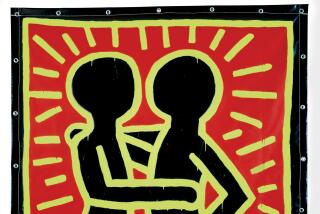‘Thanksgiving’: Portrait of a Family’s Battle With AIDS
- Share via
BALTIMORE — A few weeks ago, Luke Avedon’s teacher suggested he bring his mother’s book to “Show and Tell.” The boy told his 5-year-old friends that his mom had written “Thanksgiving” about his daddy. He told them it was a book about how his daddy died from AIDS.
“I’m so glad he’s in a school like that. And I’m so proud he can be proud,” author Elizabeth Cox says.
“Thanksgiving,” published by Harper & Row, is Cox’s first book. It is a grimly honest journal of the last year and a half of life with her husband, New York musician Keith Avedon.
He had just turned 38 when he found out he had contracted AIDS. It came at a time when life seemed particularly sweet: He and Betsy had celebrated their 11th wedding anniversary, and their son was a year old. He had finished the music for a television commercial for Chanel, the proof he needed that he could support his family as a musician. (His commercial for Obsession perfume still airs on television.)
Cox’s journal records Keith’s struggles in and out of hospitals, in and out of various treatments, in and out of work, in and out of hope.
It describes her attempts to keep her family intact as Keith’s condition deteriorated, and to rationalize the episode that held them captive. It tells of their final decision as a couple: ending Keith’s suffering with an overdose of pills.
After he was found to have AIDS in the fall of 1985, Keith traced his exposure back six years to a summer when he and Betsy had tested the limits of their marriage, often staying out all night with various friends. At that time, he later confessed to his wife, he had engaged in a series of anonymous homosexual encounters. In 1979, no one had heard of AIDS.
“Every time I say my husband died of AIDS, I can see people thinking ‘What kind of man did she marry? What does this say about her marriage?’ ” Cox says. “Keith was a great, great guy. He was a wonderful husband and a wonderful father. He was a gift--not to sound too spiritual about it, but you get spiritual after going through something like this.”
She fell in love with Keith when she was a high school senior studying the flute and he was fresh from Manhattan School of Music.
The niece of Watergate special prosecutor Archibald Cox, Betsy came from a wealthy background of private schools. Keith, on the other hand, threw himself into music after a battle with polio left him with a crippled leg. He used his classical piano training to become a rock musician and songwriter.
Cox, 36, is a passionate and tireless warrior against the ignorance and secrecy attending AIDS. She stands about 5-foot-3, with straight, waist-length, blond hair; blue eyes; no makeup; high cheekbones. She has a strong, well-ordered face with the look of high standards, a face that encourages you to take the time to find the right word.
Since Keith died three years ago, Betsy has reshaped her life. She is working toward a master’s degree in social work at Hunter College; she says she cannot support Luke by performing and teaching the flute. And she finally conquered her recurring nightmare that she had contracted AIDS, even though repeated blood tests reassured her to the contrary.
“For the first two years, every time I got a cold or upset stomach, I lay in bed and wrote the letter to Luke about ‘I’m so sorry you had to lose both parents,’ ” she says. “Then I realized I was absolutely bananas. . . . I have a lot more faith in life than I think I did before Keith got sick. Although it may be very ironic, you heal, and you feel stronger, and that’s why the book is called ‘Thanksgiving.’ ”
In largest measure, perhaps, she has written “Thanksgiving” for her son.
The Keith Avedon in this book is the father with whom Luke will grow up: patient, loving, creative. A sick man, a brave man. Near the end of his life, AIDS reduced Keith to a virtually blind, miserable skeleton, sometimes hallucinating that he was once more in the polio hospital. He decided he wanted to die at home, mentally sound, without IVs, without the medicines he needed to live.
He did.
The book also speaks eloquently for the families and friends who have often suffered as silently as the individuals with AIDS.
Along with another AIDS widow, Cox founded the Mayer-Avedon support group for women whose husbands have died of the disease. Although these women have tested negative, they continue to suffer from the lies generated by their husbands’ illnesses.
Keith refused to let any of his friends know he had contracted AIDS because he and Betsy were terrified that knowledge of his illness would hurt Luke.
“I have this image of Luke falling down and no one picking him up or giving him a hug because they think he’s contaminated. I couldn’t stand it if Luke missed a hug because of his Daddy’s disease,” she wrote.
Keith’s death and the blood tests that proved Betsy and Luke to be free of AIDS finally lifted the family’s tremendous burden of secrecy.
“All of my WASP blood, all that moral stuff I was brought up with, is offended and horrified by women having to lie about what has killed their husbands, that people are dying unable to speak the name of what killed them,” she says. “How do you continue to lead a valuable life when you can’t speak the name of your enemy?
“Secrecy is the cancer of AIDS. . . . If there’s any hope, it’s got to come from being honest, from looking at the numbers, from looking at the reality, from being responsible nationally.
“Since Keith died, the only time I’ve lied about how he died is if I’m having my hair cut and a hairdresser says, ‘What did your husband die of?’ and it’s not worth going into. If Luke is around, though, I will not lie.”
Cox began keeping the journal because she felt as if her endless duties as nurse, wife and mother were devouring her.
“I was angry at Keith, but you can’t really get angry at him because he’s suffering so much. So where do you put the anger? You’re so busy coping that you don’t have time to think. There was no fooling around in life then.
“When I first showed the journal to someone, Keith had just died, and I took out all the parts when I was angry at him. I didn’t want anyone to know. In the process of a year and a half, I became braver and added things. I said to myself ‘OK, you care about AIDS; you’re going to publish this. And this is how you’re going to do it. . . .’
“It’s honest, very honest. One of my relatives read it and said, ‘You’re drinking too much in this!’
“I said, ‘Excuse me! My husband was dying!’ . . . You deal with it any way you can.”
More to Read
Sign up for our Book Club newsletter
Get the latest news, events and more from the Los Angeles Times Book Club, and help us get L.A. reading and talking.
You may occasionally receive promotional content from the Los Angeles Times.










